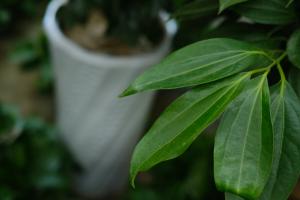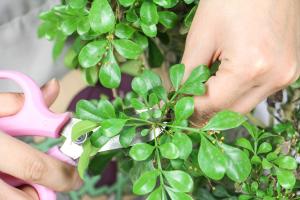Should You Water the Leaves of a Plant?
One of the most important tasks in taking care of a plant is to water it regularly. However, many people are unsure about whether or not they should water the leaves of their plants. In this article, we will explore the pros and cons of watering plant leaves and provide you with some tips for the proper care of your plants.
Pros of Watering Plant Leaves
Watering plant leaves can have several benefits. First, it can help to clean them and remove any dust, dirt or debris that may have accumulated on the surface. This can help to improve the plant's ability to absorb sunlight for photosynthesis which is vital for its growth and health.
Secondly, plant leaves can absorb water through small pores called stomata. This water can be used for transpiration which helps to maintain the plant's temperature and humidity levels. Transpiration is also important for the circulation of water and nutrients throughout the plant.
Cons of Watering Plant Leaves
Despite the benefits of watering plant leaves, there are also some potential drawbacks. One of the biggest concerns is that too much water on the leaves can lead to the growth of fungi or bacteria which can cause diseases in the plant. In addition, excessive moisture on the leaves can attract pests like aphids or spider mites which can also damage the plant.
Another negative effect of watering plant leaves is that it can cause sunburn or scorching of the leaves. This can occur in plants that are exposed to direct sunlight after being watered. The water droplets can act as magnifying glasses and intensify the sun's rays leading to damage of the foliage.
Tips for Proper Care of Your Plants
So, what is the best way to care for your plants? Firstly, it is important to only water the roots of the plant and avoid getting water on the leaves. This can be accomplished by using a watering can with a narrow spout or by directing the water towards the soil at the base of the plant.
Secondly, you should avoid over-watering your plants. This can be done by checking the soil moisture level regularly and watering only when the soil is dry to the touch. You should also ensure that the plant has adequate drainage to prevent water from pooling and causing root rot.
Finally, it is important to monitor your plants for signs of disease or pest infestation. If you notice any abnormal growth or discoloration, you should take action to protect your plant. This may include using an appropriate fungicide or pesticide, or simply adjusting your watering habits to prevent further damage.
Conclusion
In conclusion, there are both pros and cons to watering plant leaves. While it can help to remove debris and improve photosynthesis, it can also lead to disease and pest infestation. To properly care for your plants, it is important to only water the roots and to monitor them regularly for signs of damage. By following these tips, you can help ensure that your plants stay healthy and thrive for years to come.

 how many times do yo...
how many times do yo... how many planted tre...
how many planted tre... how many pine trees ...
how many pine trees ... how many pecan trees...
how many pecan trees... how many plants comp...
how many plants comp... how many plants can ...
how many plants can ... how many plants and ...
how many plants and ... how many pepper plan...
how many pepper plan...





























